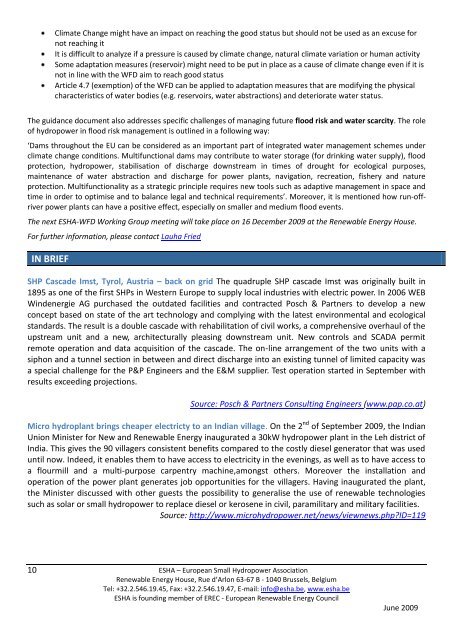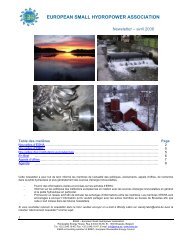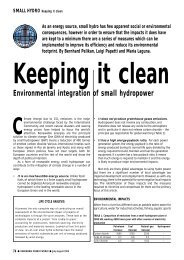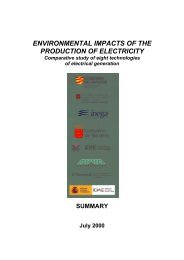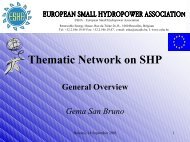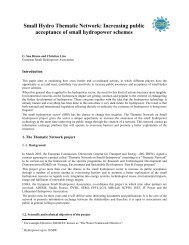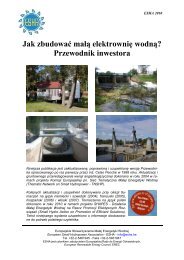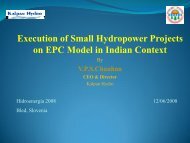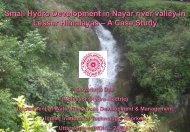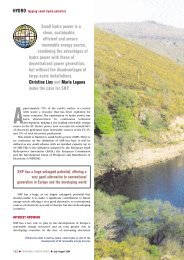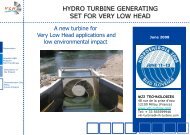EUROPEAN SMALL HYDROPOWER ASSOCIATION - ESHA
EUROPEAN SMALL HYDROPOWER ASSOCIATION - ESHA
EUROPEAN SMALL HYDROPOWER ASSOCIATION - ESHA
Create successful ePaper yourself
Turn your PDF publications into a flip-book with our unique Google optimized e-Paper software.
10<br />
Climate Change might have an impact on reaching the good status but should not be used as an excuse for<br />
not reaching it<br />
It is difficult to analyze if a pressure is caused by climate change, natural climate variation or human activity<br />
Some adaptation measures (reservoir) might need to be put in place as a cause of climate change even if it is<br />
not in line with the WFD aim to reach good status<br />
Article 4.7 (exemption) of the WFD can be applied to adaptation measures that are modifying the physical<br />
characteristics of water bodies (e.g. reservoirs, water abstractions) and deteriorate water status.<br />
The guidance document also addresses specific challenges of managing future flood risk and water scarcity. The role<br />
of hydropower in flood risk management is outlined in a following way:<br />
‘Dams throughout the EU can be considered as an important part of integrated water management schemes under<br />
climate change conditions. Multifunctional dams may contribute to water storage (for drinking water supply), flood<br />
protection, hydropower, stabilisation of discharge downstream in times of drought for ecological purposes,<br />
maintenance of water abstraction and discharge for power plants, navigation, recreation, fishery and nature<br />
protection. Multifunctionality as a strategic principle requires new tools such as adaptive management in space and<br />
time in order to optimise and to balance legal and technical requirements’. Moreover, it is mentioned how run-offriver<br />
power plants can have a positive effect, especially on smaller and medium flood events.<br />
The next <strong>ESHA</strong>-WFD Working Group meeting will take place on 16 December 2009 at the Renewable Energy House.<br />
For further information, please contact Lauha Fried<br />
IN BRIEF<br />
SHP Cascade Imst, Tyrol, Austria – back on grid The quadruple SHP cascade Imst was originally built in<br />
1895 as one of the first SHPs in Western Europe to supply local industries with electric power. In 2006 WEB<br />
Windenergie AG purchased the outdated facilities and contracted Posch & Partners to develop a new<br />
concept based on state of the art technology and complying with the latest environmental and ecological<br />
standards. The result is a double cascade with rehabilitation of civil works, a comprehensive overhaul of the<br />
upstream unit and a new, architecturally pleasing downstream unit. New controls and SCADA permit<br />
remote operation and data acquisition of the cascade. The on-line arrangement of the two units with a<br />
siphon and a tunnel section in between and direct discharge into an existing tunnel of limited capacity was<br />
a special challenge for the P&P Engineers and the E&M supplier. Test operation started in September with<br />
results exceeding projections.<br />
Source: Posch & Partners Consulting Engineers (www.pap.co.at)<br />
Micro hydroplant brings cheaper electricty to an Indian village. On the 2 nd of September 2009, the Indian<br />
Union Minister for New and Renewable Energy inaugurated a 30kW hydropower plant in the Leh district of<br />
India. This gives the 90 villagers consistent benefits compared to the costly diesel generator that was used<br />
until now. Indeed, it enables them to have access to electricity in the evenings, as well as to have access to<br />
a flourmill and a multi-purpose carpentry machine,amongst others. Moreover the installation and<br />
operation of the power plant generates job opportunities for the villagers. Having inaugurated the plant,<br />
the Minister discussed with other guests the possibility to generalise the use of renewable technologies<br />
such as solar or small hydropower to replace diesel or kerosene in civil, paramilitary and military facilities.<br />
Source: http://www.microhydropower.net/news/viewnews.php?ID=119<br />
<strong>ESHA</strong> – European Small Hydropower Association<br />
Renewable Energy House, Rue d’Arlon 63-67 B - 1040 Brussels, Belgium<br />
Tel: +32.2.546.19.45, Fax: +32.2.546.19.47, E-mail: info@esha.be, www.esha.be<br />
<strong>ESHA</strong> is founding member of EREC - European Renewable Energy Council<br />
June 2009


